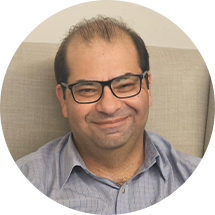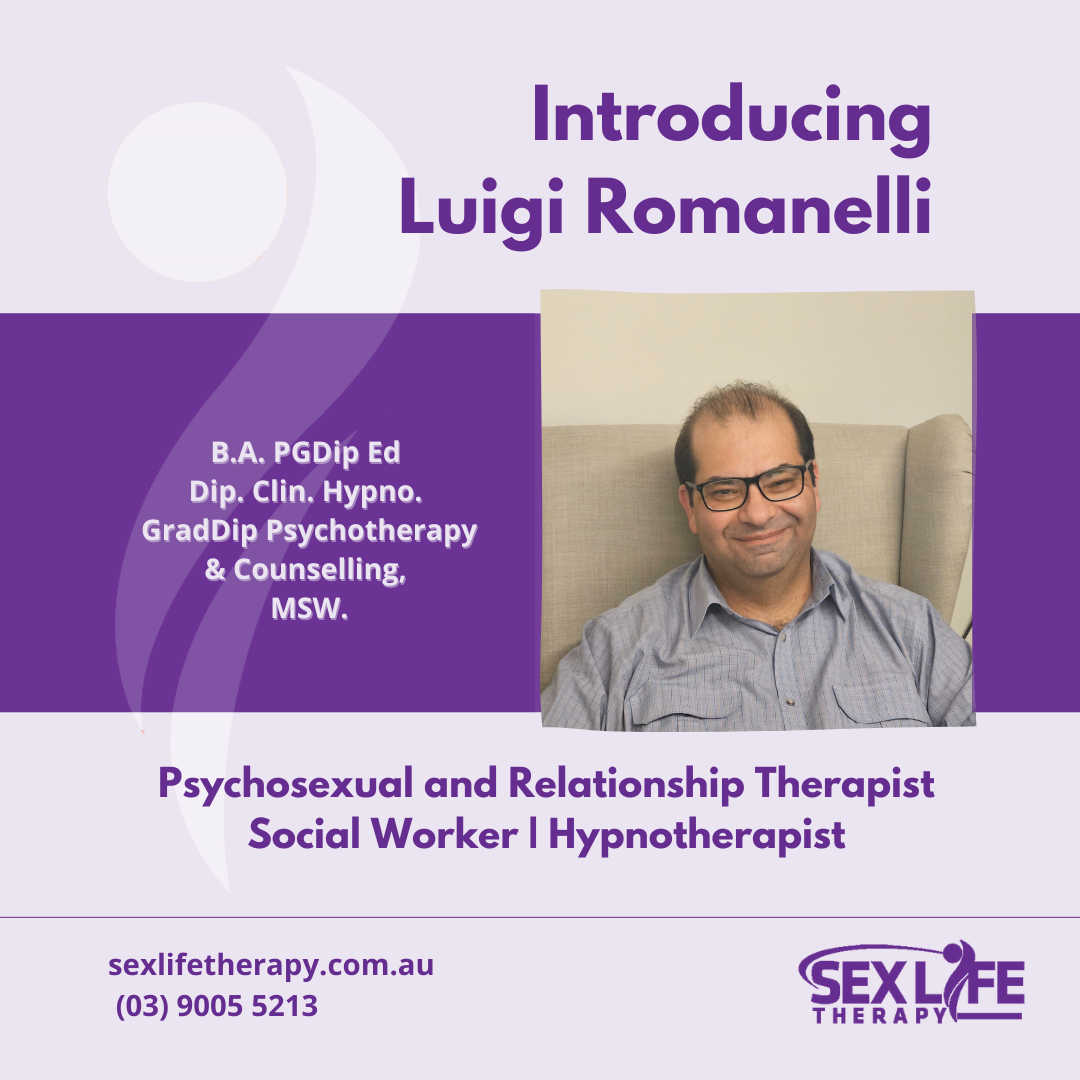Luigi is practical, hands-on and curious when it comes to his work with clients. His diverse experience as an educator, social worker and counsellor allows him to work with a range of clients of all ages. Luigi encourages people to “tell it like it is” so he can assess and work together with his client. He uses hypnotherapy to address a range of psychosexual and general psychological wellbeing issues.
How did you get your start in counselling?
My first gig was actually teaching and during this time I was spending a lot of time liaising with school counsellors. That experience brought back my interest in human behaviour. So, I went back to the drawing board and decided to change my career. I then found an advertisement one Saturday morning for a hypnotherapy course. Since then, I’ve worked for a number of years as a clinical hypnotherapist and counsellor. In 2016 I completed my Master of Social Work. This August 2024 will be my 19th year in hypnotherapy and my 8th year as a social worker.
When did you get involved in sex therapy?
I’ve been involved in sex therapy from day one of my career as a hypnotherapist. I learnt about the Society of Australian Sexologists (SAS) through my studies and through an unexpected turn of events, I became the Tasmanian president of SAS for a number of years. This really gave me an opportunity to really get right into the wonderful world of sex therapy.
Tell me a little about how you work with potential clients?
In my work I stay focused on the question – “What does this person require from me?” Then it’s about giving clients assurance that in the big scheme of things everything will be okay…not necessarily perfect, or sometimes even how they want it, but that things will get better. I create a space where it is safe to talk with me about whatever it is that’s been bothering them. I often explicitly give people permission to just tell it as it is; that there is no need to mince words, especially when we’re doing work of a psychosexual nature. When the client just puts it out there, then I can assist them.
For those who aren’t familiar with hypnotherapy, can you tell me what a first season would look like?
When starting a hypnotherapy session, I always ask clients – “do you want to experience hypnotherapy?” If the answer is no, we don’t go any further. Informed consent is important to establish first off and this includes making sure the client understands the hypnotic phenomenon. People are curious about hypnotherapy and arrive with expectations from movies, or through third-hand experiences. It’s not until we start talking they understand that what we’re doing here is actually generating a relaxed body response. It’s not like being given an anaesthetic for surgery where you’ll be knocked out or made to cluck like a chicken in a stage hypnosis event. To help guide people to this relaxed state I just use my voice – no pocket watch or gizmos. I’ll sometimes ask people to focus their attention on their breathing or a spot on the wall to facilitate that extra focus that they need to experience the hypnotic phenomenon.
What is a hypnotic phenomenon like to experience?
We can go into a hypnotic state when we do a routine action, like driving from home to work. We can achieve this state in therapy through suggestions, repetition, and metaphors to create a safe and conducive space where we can support people in making appropriate changes. How exactly it all happens no one has ever been able to prove. However, the bottom line is that most people will find the experience of hypnosis to be very pleasant and enjoyable. It’s a deep relaxation that allows clients to make those profound shifts that they need.
What about people who say they can’t be hypnotised?
When people say that hypnotherapy doesn’t work it’s about first, clarifying if they felt safe in that moment and second if they actually wanted to experience hypnosis. I do have an experience where someone had a session and cancelled their follow-up appointment because they thought the hypnosis did not work. I checked in with them and the client had gone from smoking 50+ cigarettes a day to none. The client did not think that there was any connection between what we did in session and them being able to stop smoking. Sometimes after hypnosis there’s a light bulb moment. An “I’ve got myself where I need to be.” But that’s not always the case. Sometimes, the change can happen and not be noticed till much later. Either way it’s always interesting when people allow themselves to utilise this very different approach to therapy.
Could you tell me a little bit more about what hypnotherapy can help address?
Well, it can help with behaviours, so a lot of the non-psychosexual work I do is around smoking, phobias, generalised anxiety, depression, building up confidence for public speaking, doing interviews like this one, job interviews and pain management. It can also help with giving people in sports, including extra focus or help with commitment to turning up to the gym at some ungodly hour. The other thing is that it can help with people preparing to undertake dental work. So yes, there’s a lot of other things hypnotherapy can assist with.
What is a misconception about sex therapy you would like to clear up?
Allow me to use a coffee metaphor: sex therapy is like crafting the perfect cup of coffee. Some people expect an instant-coffee style of sex therapy: quick fixes and immediate results. But much like a barista-made coffee, really deep and productive therapy takes time, patience, and care to get just right—it is a process worth the time and effort!
Now, I’ll admit—I’m loyal to a very particular brand of coffee. My favourite coffee brand happens to be Lavazza. Fun fact: it was founded by another Luigi!
Lastly to finish up, what do you do when you’re not in the office?
When I’m not in the office, I’m on the airwaves! For over 20 years, I have hosted a community radio show on Italian language and culture, presented primarily in Italian (with some English thrown in). I also host a world music programme in English. Alongside presenting, I have also been elected to sit on two national boards that focus on multicultural broadcasting and community media training. Radio can be demanding, and it is a vital part of my self-care. It gives me a creative outlet and keeps me connected to the community. As well, music helps me step back, reflect, and recharge, which is essential for maintaining my own mental health. Balancing radio and work commitments has taught me how to manage stress and recharge effectively.
I encourage my clients to explore their own ways of finding balance, especially when life gets hectic.
Thank you Luigi for taking the time to chat with us.

Read more about Luigi Romanelli
Read more about clinical hypnotherapy


